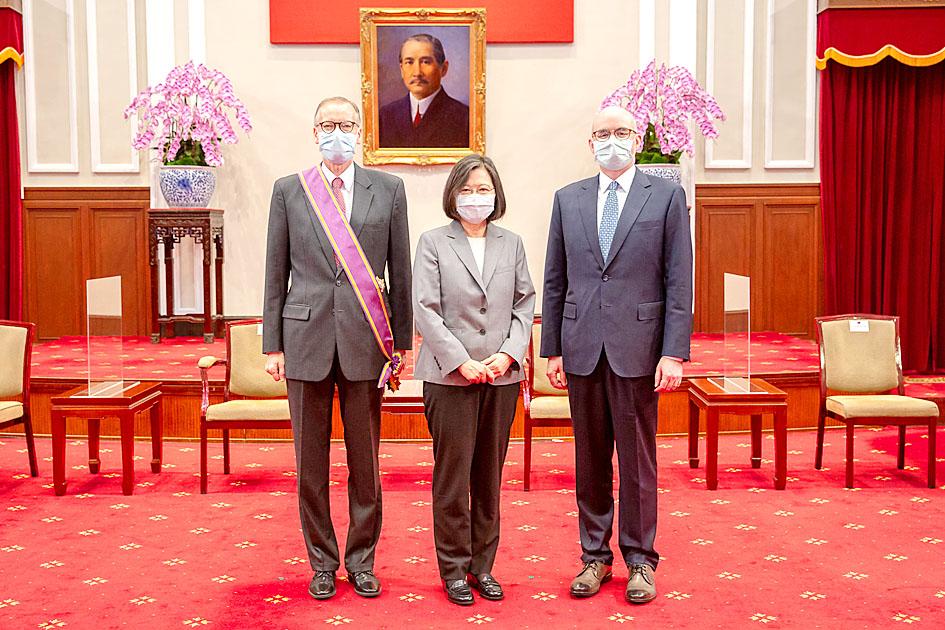American Institute in Taiwan (AIT) Director Brent Christensen, whose three-year term ends this summer, was yesterday recognized by President Tsai Ing-wen (蔡英文) for his contributions to Taiwan-US relations.
In accepting the Order of the Brilliant Star with Grand Cordon, Christensen said he was pleased to see growth in bilateral ties as the two sides weathered the COVID-19 pandemic over the past year and a half.
“The achievements we have reached together during that time are a true testament of the determination and creativity that we share in our efforts to advance the relationship,” Christensen said during a ceremony at the Presidential Office in Taipei.

Photo courtesy of the Presidential Office via CNA
The recent outbreak in Taiwan has brought the two nations even closer, he said.
“The events of recent weeks will be among my most cherished memories during my tenure as AIT director,” he said.
They include three US senators arriving on June 6 aboard a US Air Force C-17 Globemaster III freighter to announce the donation of 750,000 doses of the Moderna vaccine to Taiwan, and the delivery on Sunday of 2.5 million vaccine doses — more than three times the amount promised — he said.
Progress has also been made between Taiwan and the US in areas such as security cooperation, economic relations and people-to-people ties, Christensen said.
The US, based on its commitment under the Taiwan Relations Act to support Taiwan’s self-defense efforts, has also approved nearly US$17 billion of arms sales to the nation, he said.
He was also pleased that talks under the Taiwan-US Trade and Investment Framework Agreement would resume in the near future, he added.
“I may be leaving Taiwan, but Taiwan will never leave me,” Christensen said.
Tsai lauded his contributions to bilateral relations, saying that the achievements represented real progress and real friendship between the countries.
On Thursday, Christensen and AIT Deputy Director Raymond Greene also received awards from the Ministry of Foreign Affairs for their diplomatic achievements.

A Ministry of Foreign Affairs official yesterday said that a delegation that visited China for an APEC meeting did not receive any kind of treatment that downgraded Taiwan’s sovereignty. Department of International Organizations Director-General Jonathan Sun (孫儉元) said that he and a group of ministry officials visited Shenzhen, China, to attend the APEC Informal Senior Officials’ Meeting last month. The trip went “smoothly and safely” for all Taiwanese delegates, as the Chinese side arranged the trip in accordance with long-standing practices, Sun said at the ministry’s weekly briefing. The Taiwanese group did not encounter any political suppression, he said. Sun made the remarks when

PREPAREDNESS: Given the difficulty of importing ammunition during wartime, the Ministry of National Defense said it would prioritize ‘coproduction’ partnerships A newly formed unit of the Marine Corps tasked with land-based security operations has recently replaced its aging, domestically produced rifles with more advanced, US-made M4A1 rifles, a source said yesterday. The unnamed source familiar with the matter said the First Security Battalion of the Marine Corps’ Air Defense and Base Guard Group has replaced its older T65K2 rifles, which have been in service since the late 1980s, with the newly received M4A1s. The source did not say exactly when the upgrade took place or how many M4A1s were issued to the battalion. The confirmation came after Chinese-language media reported

The Taiwanese passport ranked 33rd in a global listing of passports by convenience this month, rising three places from last month’s ranking, but matching its position in January last year. The Henley Passport Index, an international ranking of passports by the number of designations its holder can travel to without a visa, showed that the Taiwan passport enables holders to travel to 139 countries and territories without a visa. Singapore’s passport was ranked the most powerful with visa-free access to 192 destinations out of 227, according to the index published on Tuesday by UK-based migration investment consultancy firm Henley and Partners. Japan’s and

BROAD AGREEMENT: The two are nearing a trade deal to reduce Taiwan’s tariff to 15% and a commitment for TSMC to build five more fabs, a ‘New York Times’ report said Taiwan and the US have reached a broad consensus on a trade deal, the Executive Yuan’s Office of Trade Negotiations said yesterday, after a report said that Washington is set to reduce Taiwan’s tariff rate to 15 percent. The New York Times on Monday reported that the two nations are nearing a trade deal to reduce Taiwan’s tariff rate to 15 percent and commit Taiwan Semiconductor Manufacturing Co (TSMC, 台積電) to building at least five more facilities in the US. “The agreement, which has been under negotiation for months, is being legally scrubbed and could be announced this month,” the paper said,